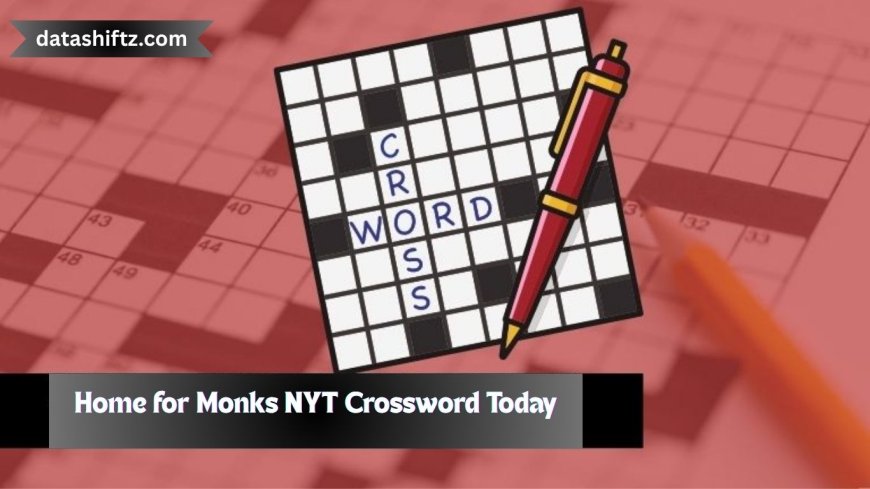Cracking the Clue: “Home for Monks” in Today’s NYT Crossword

The New York Times Crossword is a cultural staple that blends wit, knowledge, and vocabulary into a daily ritual for many. Every puzzle is more than just a pastime—it's a journey through language, trivia, and clever construction. One clue that often intrigues solvers is "Home for monks". Today, we delve into this clue featured in the NYT Crossword Today, exploring its meaning, variations, and helpful strategies for solving similar entries.
The Clue: "Home for Monks"
The clue "Home for monks" is relatively common in crossword puzzles and typically has a straightforward answer. However, depending on the length of the entry and surrounding clues, it can take various forms.
Today’s answer (as seen in the NYT crossword):
ABBey
This 5-letter word fits perfectly into the grid and context. But let's break it down and explore why “abbey” is often the correct solution.
Understanding the Clue in Context
What Is an Abbey?
An abbey is a type of monastery used by monks or nuns. It is often a large, enclosed religious complex where residents live, pray, and work in spiritual seclusion. Historically, abbeys have been associated with Catholic traditions and can include dormitories, chapels, gardens, and cloisters.
Why the Clue Is Tricky
-
The clue "Home for monks" is deceptively simple.
-
It could potentially point to various terms like:
-
Monastery
-
Cloister
-
Priory
-
Hermitage
-
But “abbey” remains the most crossword-friendly, primarily because of its frequent letter pattern compatibility.
Common Crossword Answers for "Home for Monks"
| Clue Variation | Possible Answer | Letters | Notes |
|---|---|---|---|
| Home for monks | Abbey | 5 | Most frequent answer |
| Monks’ residence | Monastery | 9 | Used in longer clues |
| Religious home | Cloister | 8 | Sometimes used for nuns as well |
| Solitary monk’s dwelling | Hermitage | 9 | More obscure |
| Old monastic site | Priory | 6 | Less common |
Tips for Solving Crossword Clues Like This
1. Consider the Clue’s Tone and Simplicity
Clues in the NYT crossword vary in difficulty depending on the day. A Monday clue like “Home for monks” will likely expect a common term such as “abbey.” A Saturday clue might require “hermitage” or something more obscure.
2. Count the Letters
If you’re stuck, check the number of blank spaces. This can eliminate incorrect possibilities. “Monastery” won’t fit in a 5-letter space.
3. Use Cross-Checks
Use other intersecting words to confirm or eliminate letters. For example, if the third letter must be a “B,” then “abbey” becomes the most logical choice.
Other Religious Dwelling Terms Found in Crosswords
Here’s a list of religious living places that might appear in NYT crosswords, especially as alternatives to “abbey”:
-
Priory – Smaller than an abbey, often governed by a prior.
-
Monastery – A general term for a community of monks.
-
Hermitage – A secluded residence for a hermit or solitary monk.
-
Cloister – Often refers to the covered walkways of a monastery.
-
Convent – A community of nuns (but occasionally appears with monk-related clues).
-
Cell – A small room in a monastery; sometimes used in puzzles.
-
Sanctuary – Though broader, it sometimes fits thematic clues.
Historical and Cultural Notes on Abbeys
Abbeys have existed for centuries across Europe and other parts of the world. Famous examples include:
-
Westminster Abbey in London, a UNESCO World Heritage Site.
-
Mont Saint-Michel in France, a dramatic abbey atop a tidal island.
-
Cluny Abbey in France, once the largest church in Christendom.
These sites were not just homes for monks; they were also centers of education, art, and agriculture. Crossword clues often tap into this historical weight, adding depth to seemingly simple questions.
Final Thoughts
Solving crossword puzzles, especially those by The New York Times, is an exercise in pattern recognition, cultural knowledge, and lateral thinking. Clues like “Home for monks” are both educational and intriguing. While “abbey” is today’s correct answer, knowing the broader context helps solvers approach future puzzles with more confidence.



























